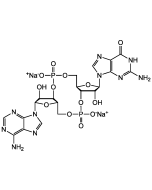Cookie Policy: This site uses cookies to improve your experience. You can find out more about our use of cookies in our Privacy Policy. By continuing to browse this site you agree to our use of cookies.
AdipoGen Life Sciences
anti-Cardif (human), mAb (Adri-1)

Picture courtesy of Prof. Darius Moradpour, CHUV, Lausanne.
| Product Details | |
|---|---|
| Synonyms | CARD Adapter Inducing Interferon-β; IPS-1; MAVS; Mitochondrial Antiviral Signaling Protein; VISA; Virus-induced Signaling Adapter; Interferon-β Promoter Stimulator Protein 1 |
| Product Type | Monoclonal Antibody |
| Properties | |
| Clone | Adri-1 |
| Isotype | Mouse IgG2b |
| Source/Host | Purified from concentrated hybridoma tissue culture supernatant. |
| Immunogen/Antigen | Recombinant human Cardif (aa 160-450). |
| Application |
Immunocytochemistry: (1:100) |
| Crossreactivity | Human |
| Specificity |
Recognizes human Cardif. |
| Purity | ≥95% (SDS-PAGE) |
| Purity Detail | Protein G-affinity purified. |
| Concentration | 1mg/ml |
| Formulation | Liquid. In PBS containing 10% glycerol and 0.02% sodium azide. |
| Isotype Negative Control | |
| Shipping and Handling | |
| Shipping | BLUE ICE |
| Short Term Storage | +4°C |
| Long Term Storage | -20°C |
| Handling Advice |
After opening, prepare aliquots and store at -20°C. Avoid freeze/thaw cycles. |
| Use/Stability | Stable for at least 1 year after receipt when stored at -20°C. |
| Documents | |
| MSDS |
 Download PDF Download PDF |
| Product Specification Sheet | |
| Datasheet |
 Download PDF Download PDF |
RIG-I (retinoic acid-inducible gene I; Ddx58) and MDA5 (melanoma differentiation-associated gene 5, also known as Ifih1 or Helicard) are proteins that sense viral replication intermediates, such as double-stranded RNA and triggers the host antiviral programs. These molecules signal the downstream activation of NF-κB and IFN regulatory factor (IRF) -3, which coordinately regulate the expression of type-I interferons. Cardif (also called VISA/IPS-1/MAVS) is a new CARD (caspase activation and recruitment domain)-containing adaptor protein that interacts with the CARD domain of RIG-I and MDA5, leading to the activation of NF-κB and IRF3. Cardif is located to the mitochondrial outer membrane. Removal of the mitochondrial-targeting domain of cardif abolishes its ability to induce IFNs. Cardif is cleaved and inactivated by NS3-4A, a serine protease from hepatitis C virus known to block interferon-β production.
- TRADD Protein Is an Essential Component of the RIG-like Helicase Antiviral Pathway: M.C. Michallet, et al.; Immunity 28, 651 (2008)
- Cleavage of mitochondrial antiviral signaling protein in the liver of patients with chronic hepatitis C correlates with a reduced activation of the endogenous interferon system: P. Bellecave, et al.; Hepatology 51, 1127 (2010)
- Quantitative proteomics identifies the membrane-associated peroxidase GPx8 as a cellular substrate of the hepatitis C virus NS3-4A protease: K. Morikawa, et al.; Hepatology 59, 423 (2014)
- Hepatitis C virus variants resistant to macrocyclic NS3-4A inhibitors subvert IFN-β induction by efficient MAVS cleavage: C. Welsch, et al.; J. Hepatol. 62, 779 (2015)
- Extended interaction networks with HCV protease NS3-4A substrates explain the lack of adaptive capability against protease inhibitors: G. Dultz, et al.; J. Biol. Chem. 295, 13862 (2020)
- Deficiency in coatomer complex I causes aberrant activation of STING signalling: A. Steiner, et al.; Nature Comm. 13, 2321 (2022)






